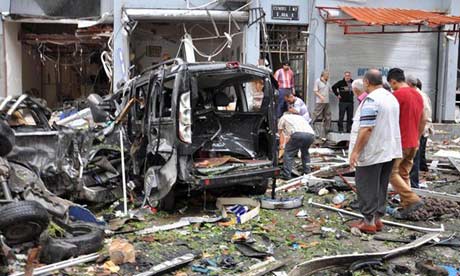See also Turkey Audio Feature: Kurdish Fighters Withdraw From Turkey To Iraq
 Last week, two car bombs exploded in Reyhanli in southern Turkey, close to the Syrian border, killing almost 50 people and injuring more than 100.
Last week, two car bombs exploded in Reyhanli in southern Turkey, close to the Syrian border, killing almost 50 people and injuring more than 100.
While nobody claimed responsibility for the deadly incident, it raised the immediate question of whether Turkey would escalate its intervention in Syria, either alone or with others.
However, that reaction was too narrow and missed the wider context. This is not just about the Syrian conflict but also Turkey's internal politics, specifically its attempt to resolve the sensitive Kurdish issue.
The primary concern for the Erdogan government is the ongoing peace drive with the Kurdish leadership, including imprisoned PKK leader Abdullah Ocalan. So the question is not just whether the events in Reyhanli complicated Turkey's position inside Syria but also whether they threaten these delicate internal negotiations.
***
Despite the token advance of the initial PKK withdrawal, the fundamental challenge for the process remains: this is not just a negotiation, but a play for power by both Prime Minister Recep Tayyip Erdogan and the PKK.
Erdogan's quest is not as much versus the Kurdish movement as it is against other groups within the Turkish system. As he pursues a new Constitution which would consolidate his authority, Erdogan has been unwilling to share any power with opposition parties in the peace process, the oversight of the withdrawal, and Turkey's manoeuvres over Syria.
With Parliament sidelined, the Kurds are pursuing a longer political game, Using the limited space the PKK has through its position in Iraq and links with the Kurdish Regional Government, they are trying to use the peace initiative to establish a political stake in a "democratic" Turkey in the long-term.
So, while "playing nice" with the Erdogan Government during the negotiations, the PKK, other Kurdish groups, and opposition parties will try to build their relationships in response to the Prime Minister's quest for expanded power.
Doing so, they are connecting the internal manoeuvres to Turkey's regional initiatives and developments in Iraq and Syria. The PKK's deputy leader Murat Karayilan, who called the Kurdish problem declared last week:
The Kurdish problem is not just a regional problem but also an international one. International powers had role in developing the Kurdish denial policy that led to genocide, massacres and heavy tragedies against Kurdish people. Today, there are also roles for these international powers in overcoming injustice and solving the problem. Therefore, we are calling on international powers --- the US, EU and Russia notably to give support to make this prone-to-solution move we have started successful.
So, when Karayilan called on all organisations to create a national platform for cooperation, he was also looking outside Turkey to Masoud Barzani, the President of the Iraqi Kurdistan region, to use his political and diplomatic influence.
That is why the PKK's withdrawal into northern Iraq is more than token. With its acceptance of the move, the Iraqi Kurdistan Regional Government has signaled that it can both work with Ankara --- this week, the KRG announced a major oil project with both Turkey and the US company Exxon --- and with the Turkish Kurdish movement.
Erdogan's ruling AKP may try to limit this Iraqi Kurdish involvement, but --- needing the PKK withdrawal as well as the wider economic possibilities --- it cannot exclude it.
So the car bombs in Reyhanli become an incident not only to emphasise "security" but for all sides to make moves linking the internal and regional negotiations. The opposition BDP's co-chairman, Selahattin Demirtas, declared that it will stand by the government, but pressed Erdogan:
The attack that came true in Reyhanli brings the Syrian link to our minds. We will have a much better evaluation as a consequence of a healthy investigation. At this stage, Syria comes to mind, it can be evaluated that this is a reflection of the war inside Syria.
What is targeted is the political atmosphere inside Turkey, this is clear.
Such attacks could target every region, every part of Turkey. A Allawi-Sunni, Kurdish-Turkish tension could be created here.
The Erdogan Government will soon reply to Demirtas. But when he does so, the Prime Minister will not only have to answer the Turkish opposition. Indeed, he will not only be responding in the peace process with the PKK: he will also be sending a message to the Iraqi Kurds and to all those who are watching for Turkey's next steps in Syria.